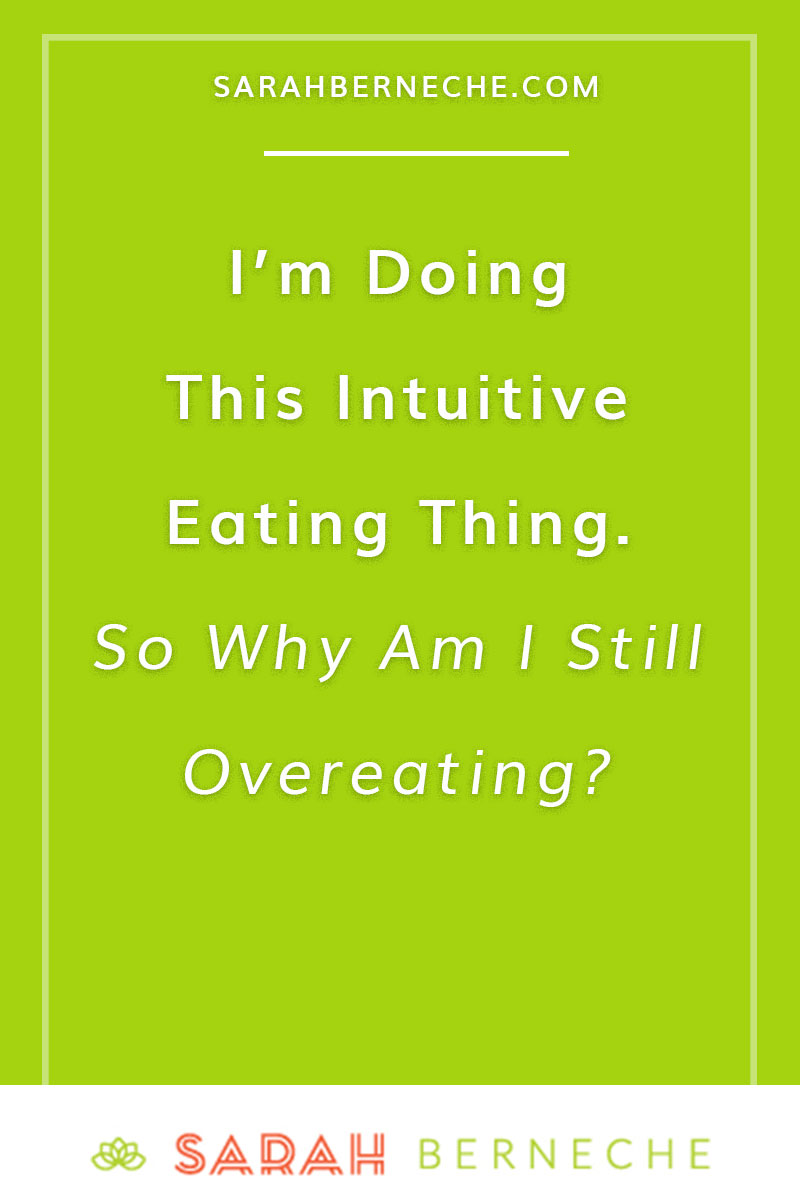“I’ve been doing this intuitive eating thing, but…I keep overeating. You said I would feel sane around food if I gave myself permission to eat whatever I wanted, so what gives?”
As an intuitive eating counsellor and nutritionist — someone who helps women all over the world to stop bingeing, make peace with food, and feel at ease in whatever body they happen to find themselves in — one of the chief concerns I encounter involves “overeating.”
Because “overeating” isn’t as clear a term as you’d think, let’s start there.
Eating more than you did when you were dieting is not “overeating.”
Eating more than what your fitness tracker recommends is not “overeating.”
Eating what you feel is a large volume of food is not “overeating.”
Eating beyond the “portion” on the label is not “overeating.”
Eating more than what’s on your meal plan is not necessarily “overeating.”
Quite “simply” (ha — is anything ever simple when it comes to food and body?!) — “overeating” means eating beyond fullness. It can occur at any time (during a scheduled meal, over the holidays, or while snacking), and for any reason (by accident, because you’re recovering from an eating disorder and you need to overeat, because you’re trying to mitigate anxiety or uncomfortable feelings, and so on.)
Intuitive eaters seldom overeat. Not because we’re a superior brand of species, but because we know we can eat what we want, when we want, and in the amount that we want. Truly. Madly. Deeply.
But if you’re perpetually overeating, does it mean you’re “failing” at intuitive eating?
It’s one thing to logically give yourself unconditional permission to eat.
It’s another to live it.
Here are a few reasons why you’re still overeating:
-
You’re judging what you eat, the amount you eat, or when you eat.
Darling, judging is another word for restriction — and is the furthest thing from unconditional permission. In my experience, this judgment usually stems from a fear of what your “intuitive eating experiments” will do to your body. When you’re panicked about how much weight you’ll gain or how your shape will change from not dieting, you’ll resort to your primary and most comforting coping mechanism: food.
This is why I feel intuitive eating (or recovery from diet culture or an eating disorder) works most effectively when combined with body image work, self-compassion, self-care, and psychotherapy.
I’m blue in the face from saying it, but truly: restriction always leads to “eating issues.”
I cover this extensively in my coaching practice, but this gives you a head start.
2. You’re worried about your weight.
This concern feels genuine, and I have a ton of empathy for it. But honestly? This worry is never exclusively about the weight. Thinness doesn’t live in a vacuum.
Why do you care about becoming or staying thin?
…Maybe you believe it will help your chances of meeting the love of your life.
…Or help you to feel more confident sporting that string bikini on the beach.
…Help you to make friends and feel a sense of belonging.
…Allow you to finally accept your body so you stop killing yourself at the gym.
…Get your [parental figure] off your back and finally experience their acceptance.
Yes, being thin comes with specific privileges (“thin privilege” is real). Still, we also carry several convictions about thinness (and fatness) and its symbolism that inform our eating choices and how we view our relationship with food.
3. It’s your only coping mechanism.
“Emotional eating” isn’t pathological; I’m a big believer in legalizing emotional eating.
But as you dive deeper into intuitive eating, you’ll find 1) food no longer offers the comfort it once did 2) you may wish to process your feelings a little differently.
Some things I recommend implementing that were personally helpful:
-
Being extremely diligent about your self-care. This may mean having standard sleep and wake times, taking an evening bath, trying a skincare routine, participating in joyful movement (if this is available to you at this time), spending time with friends or family, taking regular breaks, eating regularly and adequately, keeping hydrated, diffusing essential oils, limiting caffeine and/or alcohol, and so on. It needs to be personally meaningful and something you can do without much effort. Also, it doesn’t have to cost anything.
-
Finding a therapist — ideally a weight-neutral, eating disorder-informed one.
-
Actively try other coping mechanisms, such as journaling, calling a friend, going for a walk, meditating, or listening to music. It takes time to foster new habits, so be patient with this.
-
Meet yourself with self-compassion. I highly recommend Dr. Kirstin Neff’s Self-Compassion.
Is this something you struggle (or struggled) with while starting intuitive eating? Let me know in the comments!

[…] …You don’t want to deprive yourself of sweets, but you don’t feel satisfied by the amount of sugar you’re eating until you feel you’ve overdone it. […]
[…] before you decide that you’re not cut out for intuitive eating — that intuitive eating may work for some people, but not you — we need to dig deep into […]
[…] Intuitive Eating: 5 Common Pitfalls (That Will Keep You Diet-Binge Cycling) Emotional Eating Decoding: What Am I Really Hungry For? Food Addiction and Intuitive Eating: Are you “addicted” to food or just deprived? I’m Doing This Intuitive Eating Thing — So Why Do I Keep Overeating? […]
[…] I’m Doing This Intuitive Eating Thing — So Why Do I Keep Overeating? […]